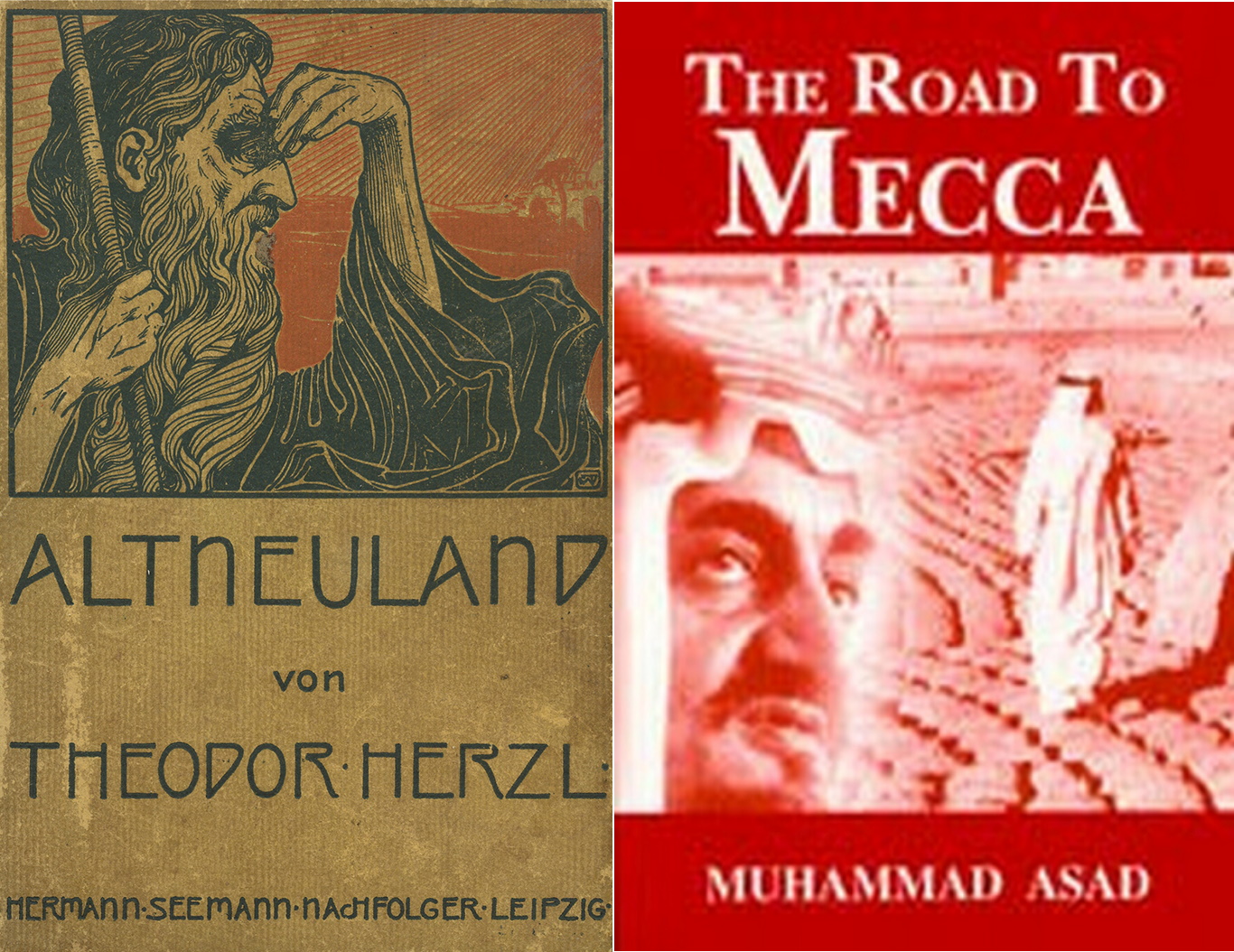There is a way out of the Israel-Palestine impasse. Really, the only way out. And it has been staring us in the face since the time when Zionism in its present form was taking shape, from 1900 to 1940. This was Herzl's intent. His Altneuland (The Old New Land, 1902), is a vision of what he hoped would be accomplished by 1923.
Theodore Herzl did not foresee any implacable conflict between Jews and Arabs.
One of the main characters in Altneuland is Haifa engineer Reshid Bey, who is one of the leaders of the New Society. He is very grateful to his Jewish neighbours for improving the economic condition of Israel and sees no cause for conflict. All non-Jews have equal rights with Jews, and an attempt by a fanatical rabbi to disenfranchise the non-Jewish citizens of their rights fails in the election which is the center of the main political plot of the novel.
So Zionism began with the idea of bringing semitic peoples together, meaning Hebrew and Arabic speakers.* Could this be done peacefully? That was the original wish of at least Herzl, Chaim Weizmann, and Ben Gurion, and remains the professed intent of all but the extreme who want to annihilate/ deport all Arabs.
Trying to unite the semites is much harder that such totalizing ‘final’ solutions, but the world rejects totalizing solutions today, be they Uighurs in China or Arab Muslims in Israel-Palestine. The daily agony of Palestinians, condoned by a uniformly pro-Zionist Europe and US establishment, makes a mockery of US-European policy in the Middle East and makes terrorism of all kinds endemic to our late capitalist world.
Lure of the East
Not only Herzl but many other early Zionists were part of the craze of the 1920s--30s, centred in Berlin, for the romance of the Bedouin, the austere desert prince, epitomized by T.E. Lawrence (of Arabia). ‘Sheik’ became a byword for cool. Hollywood churned out romantic potboilers. Rudolph Valentino was every woman’s heartthrob. The lure had begun in the 18th century with travelogues full of eastern adventures, increasing after Napoleon’s occupation of Egypt in 1800, then throughout the 19th century. Disraeli, soon to become Britain’s prime minister, wrote his novels with Jewish-Arab affinity as the underlying theme.

Disraeli set off (briefly, before settling into politics) to find his oriental roots in the desert. As did Leopold Weiss (aka Muhammad Asad), who fell in love with the Arab world and wrote a definitive translation of the Quran, as well as a compelling first hand account of his travels The road to Mecca (1954). Disraeli called Arabs ‘Jews on horseback’ and Jews ‘Mosaic Arabs’. His Wondrous Tale of Alroy (1833) portrays the problems of a medieval Jew in deciding between a small, exclusively Jewish state and a large empire embracing all. Disraeli had no qualms; he wanted a pan-oriental empire guided by wisdom of East interpreted for West by its resident orientalist Jews. Turning the anti-semtic slur on its heads, he embraced ancient desert nobility.
Disraeli’s novels preached fundamental kinship of Jews and Muslims, but as the superiority of all semites. In contrast to Weiss and other orientalists, he was not interested in the liberal argument for emancipation of Jews, i.e. universal rights of man. His parents converted the four children, so Disraeli could enter politics as Christian yet with full pride of a Jew.
In his novels Coningsby and Tancred his Jewish Svengali character Sidonia tells the protagonist: All is race. There is no other truth. (The Nazis quoted him gleefully). Mosaic Arabs and Mohammedan Arabs were two strains of same noble semitic race. Long-lost brothers come together to form the destiny of the modern world. 'The final message of Tancred is that England shall become the "supreme power" in the East, but it will never take the "throne of David".** They can be considered the first Zionist novels, long before the movement even had a public face. The British upper classes were fascinated with Judaism, they thought a Jewish state would bring stability in region.
‘Good’ Orientalism
Edward Said argues in Orientalism (1978) that Islam and Muslims are ingrained in the Western mind as "the other", oriental, opposite to the Christian and European Jewish experience. Said was dismissive of Orientalism, but it has its upside. Jewish and non-Jewish Orientalists alike were not necessarily imperialist schemers out to dupe naive Arabs. Many genuinely embraced Muslim culture and Islam itself. The trickle of western Muslims increased as soulless capitalism seeped into traditional societies.
One of the many non-Jews to become Orientalists was Marmaduke Pickthall who travelled to Cairo at age 18 in 1894 and, as he later recalled in his delightful Oriental Encounters: Palestine and Syria, ‘I ran completely wild for months, in a manner unbecoming to an Englishman; and when at length, upon a pressing invitation, I turned up in Jerusalem and used my introductions, it was in semi-native garb and with a love for Arabs.’*** Pickthall converted to Islam and reached out to shattered soldiers disillusioned with the war, some of whom converted to join the growing Muslim community in Britain, even as Christian preachers were blessing the mass slaughter.
The East was in the air of WWI Europe. While the war was fought in the mud of Europe, the Middle East was the real prize to the victor. Both Germany and Britain-France were ready, waiting for victory. The Ottoman regime, now controlled by the Young Turks, backed Germany, but the cigar went the Brits with their Lawrence. The victor ended up with resentful Arabs, who had been promised independence, but found themselves now part of the British empire already on its deathbed. And a growing stream of illegal immigrants, European Jews, invaded Palestine, escaping the cauldron heating up there. No 'semitic brothers', as they didn't speak either Hebrew or Arabic.
While Britain’s new Arab sheiks, including the Saudis, were invited to Versailles for the peace treaty, they were not treated seriously and their protests over the plan to create a Jewish state were ignored. Already the nice promises of Herzl and Chaim Weizmann were being pushed aside in the interests of power politics.
Meanwhile, the orientalist fad swept the West in the 1920s following the exploits of Lawrence of Arabia. The Arabs were known only as enigmatic, free-spirited Bedouin nomads, under the Turkish Ottomans. Their defiance of their Turkish rulers captured the imagination of Europe. Much more romance and much less gore than the trenches of Flanders. And for a brief moment, they were the darlings of the new mass media, eager for the exotic and colourful, especially as Jewish interests controlled much of German media until the rise of Hitler. By the 1870s, while 1% of Germany’s population, Jews controlled 13 out of 21 daily newspapers and had strong presence in four others.+
By 1920 the image of the Jews’ close bond to Muslims and their fellow Asians was embraced by almost all political sides in Germany and Austria.++ Judaism was seen as closer to Islam in conception of the Jewish orientalists: a total worldview and framework for life. Far from the image of Zionism as the last western colonial project, the orientalist Zionists wanted the return of the Jews to Israel to signal the rebirth of Asia and the end of colonialism. Buber: decrying the subjugation of India, the self-europeanization of Japan, the debilitation of Persia, the ravaging of China.
The oriental fad can be seen in art deco and the vogue for moorish style homes and public buildings, recalling Andalusia and Alhamra, Granada, even though there were no Sephardic Jews in Berlin, all Yiddish-speaking Ashkenazi. The elegant new synagogue in Berlin was built in 1881.
Azeri monarchist orientalist Muslim Jew
And Jews were at the heart of the new attraction. Essad Bey (also Kurban Said, ne Lev Nussimbaum, 1905--1942) was the most popular of these ‘orientalist Jews’. Disraeli was a 19th century dabbler, seeing the future in the East, but Lev (Nussimbaum) was actually from the East, born in Baku. And Berlin was the centre of this East-West mixing, with German designs on the weak Middle East states, now under British-French control.
Lev’s father Abraham was a Georgian Jew, his mother, Berta Slutzkin, a Russian Jew; they joined the many other adventurers in the late 1900s oil boom in Baku. Berta was also active in the communist underground and committed suicide in 1911. Abraham Nussimbaum shrewdly sold his oil interests to the Nobels in 1913 and Lev lived a pseudo-aristo life of tutors and nannies till the Russian revolution hit Baku. Abraham and Lev escaped first to Bukhara, then Persia, back to Baku when briefly under the Turks, then through the mountains to Batum, Constantinople, Paris, finally settling in Berlin. His account of that life-and-death odyssey Blood and Oil in the Orient (1930) was an instant bestseller.

A narcissist, handsome and brilliant, Lev knew he was special. Raised in a secular household, he was attracted to the austere romance of Islam. Lev studied Islam and Arab at the University of Berlin, having converted in Constantinople, witnessed by the last caliph Abdulmejid II months before the caliphate was abolished. He crossdressed throughout his meteoric rise and sad fall, revelled in aliases when race and religion were fixed, deadly. And wrote a stream of popular books about the East, both Muslim and Soviet, Islam, finally a string of novels, the now classic Ali and Nino (1937), about star-crossed lovers, Muslim and Christian, Azerbaijan’s great ‘first novel’ though it is claimed as written by another Azeri, ignoring the real author. That’s a shame, as Lev loved his homeland, identifying with the ‘mountain Jews’, Azeri Jewish tribes, now just a memory, but alive and well until the revolution.
Jews were already the leading specialists in eastern religions, history and anthropology in Berlin. Lev preferred the Jewish orientalists for their neutral, even admiring tone toward Islam as a great religion, not an inferior heresy, as the Christians saw it.
Many dismissed Lev as an eccentric, a fraud, though he was sincere and his writings bestsellers. After the horrors of WWI and the Russian revolution, Lev remained a staunch monarchist. What he wanted from monarchism was really just same as what Americans want 'from liberal democracy: the right to be left alone.'+++ Jews mourned the lost kings and emperors who kept life relatively civilized and safe. Also the Ottoman version, a loosely run federation of dozens of different ethnic groups forced to live in relative harmony by nominal fealty to a distant imperial power. Palestine was a peaceful Ottoman province but with hardly any Jews, who were centred in Constantinople, Smyrna, Baghdad. It was only European Jews who were intent on Jerusalem.
This benign Orientalism linked Judaism and Islam in their common, harmonious past, and sought to conceive a common, harmonious future. Islam, in alliance with Judaism, was be an escape hatch for the encroaching threats of brutal modernity. Said criticized the insulting paradigms of the colonizing West, but he ignored these orientalists who saw that the only solution to the problem of the Jews in Palestine was to emphasize the commonality between the two groups.
Lev didn’t fit anyone’s paradigm: monarchist, Islamist, Jewish, Muslim. He saw the comic side of his life, laughing at himself and everyone, further irritating other exiles, not accepted by the few native Muslims there, with their more tribal identity leaving no room for converts. Jewish assimilation had become an anachronism, revolutionary left or right politics had become totalitarian, demanding you choose sides. Totalizing ideological systems did not allow space to get on with the business of living.
Another Jewish orientalist was Eugen Hoeflich who sought the merger of Asiatic peoples against European mechanization and mass warfare. He applauded Allah is great: the decline and rise of the Islamic world by Essa Bey and Wolfgang von Weisl, a close friend of Jabotinsky. Jews were rejected from without and suffered an identity crisis within. Bey-Weisl’s Allah is great reinvented the historical Muslim orient as free from ethnic and sectarian lines. It was published in 1936. But by then, Lev had been kicked out the Union of German Writers and had to flee to Vienna.
Conspiracies
Lev was a committed monarchist even as all the monarchies were falling. Monarchies are best for Jews, with religious tolerance and a large multicultural society loosely knit together with a benign monarch on top. He didn’t just want a constitutional monarch, as that was no better than godless democracy, which quickly becomes dictatorship and was threatening to destroy all civilization as he wrote. If modeled on the Ottomans, it would be loose, allowing all faiths. But Israel has followed Disraeli's vision of a Jewish King David II on a Jewish throne. That racial monarchy can’t work, as the European Jewish implant is alien, just as the European implant in America was alien, and European governance was/is seen only with resentment by the natives.
Lev never wrote as if Jews were superior, and he happily converted to Islam as part of his self-discovery and personal development. Interestingly Israel is still fiddling with how to institutionalize Jewish superiority into its society, with official documents coded to recognize Jew over non-Jew, and continual immigration and settlement of (mostly European) Jews on Palestinian lands, the logical conclusion of which is to leave a few isolated Palestinian bantustan theme parks and only a handful of token natives, like those in the Americas. That certainly is the conspiracy to beat all conspiracies.
Yuri Slezkine’s The Jewish Century (2006) refers to the three ‘promised lands’ of 20th century Jewry—the US, the Soviet Union and Israel—all elect conspiracies competing for world power, putting Jews at the heart of all three conspiracy factions, in line with Disraeli’s musings. Ironically, Jewish successes in achieving their goals in all these promised lands has kept anti-Jewish resentment alive.
With the Balfour letter and the Russian revolution in 1917, and the collapse of the Ottoman Caliphate the next year, it looked like the Jewish bankers and Zionists had hit the jackpot, but as Benjamin Ginsberg warned in The Fatal Embrace: Jews and the State (1993), the greater the public success of Jews in history, the higher they rise, the greater the resentment, culminating in disaster. Israel’s 74 years of ‘successes’ at the expensive of its fellow semites has created a living hell and unending violence. Time to rediscover the peaceful, universalist roots of Zionism.
xxx
*The other major semitic language is Amharic spoken by Ethiopians, who are both Christian and Muslim, the Ethiopian Jews having moved to Israel. Hebrew wasn’t spoken until Zionist immigrants started arriving in Palestine in the late 19th century. Sadly Ethiopian Jews have suffered Israel anti-black racism, so making friends with Arabic and Amharic-speakers has long way to go. Some will consider the semitic argument specious, as neither the Jews Disraeli descended from (Sephardic) nor the vast majority of Jews of Europe (and who populate and rule Israel) even spoke Hebrew, but Ladino or Yiddish, which have no relation to Hebrew at all. Nonetheless, Hebrew became the lingua franca of Israel. Arabic is not accepted as an official language and almost no Israel Jews speak it.
**Tom Reiss, The orientalist: Solving the mystery of a strange and dangerous life, 2005, 235.
***You can read it online at Project Gutenburg.
+Benjamin Ginsberg, The Fatal Embrace: Jews and the State (1993), 25.
++Reiss, op.cit., 239.
+++ibid., 124.
Kurban Said (aka Lev Nussimbaum)'s interethnic Romeo and Juliet, published in German 1937, British war film poster 2016.







